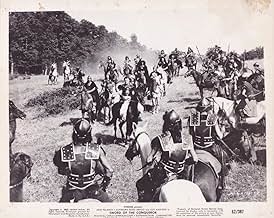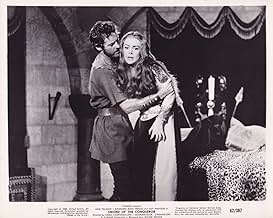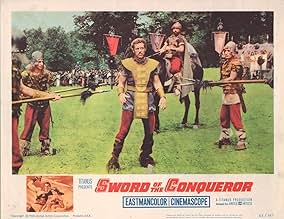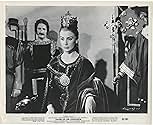NOTE IMDb
5,4/10
269
MA NOTE
Un cruel souverain lombard épouse la fille d'un autre roi, tue son père, bat son amant, mais il fait finalement face à une révolte populaire majeure contre lui.Un cruel souverain lombard épouse la fille d'un autre roi, tue son père, bat son amant, mais il fait finalement face à une révolte populaire majeure contre lui.Un cruel souverain lombard épouse la fille d'un autre roi, tue son père, bat son amant, mais il fait finalement face à une révolte populaire majeure contre lui.
Edy Vessel
- Matilde
- (as Hedy Vessel)
Histoire
Le saviez-vous
- ConnexionsFeatured in The Aunty Jack Show: The Aunty Jack Sex Show (1972)
Commentaire à la une
This is definitely superior to the dullish REVAK THE REBEL (1960) but a slightly lesser achievement than THE MONGOLS (1961); both these also star Jack Palance and were made in quick succession. A couple of years ago, a work colleague of mine (a movie-buff who worked as an extra on renowned Malta-shot productions like CLASH OF THE TITANS {1981} and MUNICH {2005}) used to wax lyrically about his VHS of this ultra-rare film being among his most treasured possessions; at the time, I was not even aware of its existence and though I soon learned about Leonard Maltin's unflattering *1/2 rating, I immediately acquired the film when the first opportunity arose (sourced from a gorgeous, high-definition TV print that, nevertheless, suffers from a couple of very minor video glitches)! Still, the fact that its director's resume' (albeit having been active since 1914
and he amazingly made this, his penultimate effort, at 76 years of age!) was pretty unenviable, I went into it with low expectations only to be pleasantly surprised by the results; for the record, I had earlier acquired Campogalliani's swan-song, the even more obscure THE AVENGER OF VENICE (1964), and which I may be able to include in my ongoing Epic marathon.
Incidentally, the English title here has no particular relevance to the plot but, then, the original – ROSMUNDA E ALBOINO – does not exactly set the screen on fire either!; those two characters, of course, are the protagonists played by Eleanora Rossi-Drago and Palance respectively. In a neat reversal of the situation in REVAK THE REBEL, it is the latter who offers a truce to the conquered king (Andrea Bosic) – this time around by marrying the man's daughter, even if she already had an illegitimate child by his most loyal lieutenant (Guy Madison)! However, the ruler proves gullible and, led on by his scheming adviser, proceeds to place the blame of their defeat on Madison; the situation deteriorates further when the two allied nations organize a friendly joust. The very first participants are Madison and Palance's younger and war-mongering (both on and offscreen) brother and, when the latter turns up dead regardless, the conqueror reiterates by beheading the king himself (in full view of his own daughter)! Feeling completely ostracized now, Madison has no choice but to flee and try to rally support for his people's cause.
Naturally, the doubly begrudged and strong-willed princess initially resists Palance's advances but eventually relents when he gets wind of her offspring's existence (once again, by way of treachery); their relationship is sort of poignant since they gradually come to at least respect one another but, given the characteristically superficial script, this element is largely lost amid the myriad court intrigues and rampant snarling! Anyway, Madison comes upon a peaceful tribe who, in order to join forces with our hero, set him the odd task of going from one side of a valley to the other via a spiked rope laid over an array of wooden stakes! In the end, Madison bursts on the scene just as Palance finally forces himself upon Rossi-Drago: the two men engage in a scuffle and, as their common enemy seems to be getting the upper hand, the woman intervenes to give him the coup-de-grace – which, this being Palance, he turns into a melodramatic showcase; the closing shot, then, presents a conventional greeting of the reunited lovers by an anonymous but over-enthusiastic crowd.
Incidentally, the English title here has no particular relevance to the plot but, then, the original – ROSMUNDA E ALBOINO – does not exactly set the screen on fire either!; those two characters, of course, are the protagonists played by Eleanora Rossi-Drago and Palance respectively. In a neat reversal of the situation in REVAK THE REBEL, it is the latter who offers a truce to the conquered king (Andrea Bosic) – this time around by marrying the man's daughter, even if she already had an illegitimate child by his most loyal lieutenant (Guy Madison)! However, the ruler proves gullible and, led on by his scheming adviser, proceeds to place the blame of their defeat on Madison; the situation deteriorates further when the two allied nations organize a friendly joust. The very first participants are Madison and Palance's younger and war-mongering (both on and offscreen) brother and, when the latter turns up dead regardless, the conqueror reiterates by beheading the king himself (in full view of his own daughter)! Feeling completely ostracized now, Madison has no choice but to flee and try to rally support for his people's cause.
Naturally, the doubly begrudged and strong-willed princess initially resists Palance's advances but eventually relents when he gets wind of her offspring's existence (once again, by way of treachery); their relationship is sort of poignant since they gradually come to at least respect one another but, given the characteristically superficial script, this element is largely lost amid the myriad court intrigues and rampant snarling! Anyway, Madison comes upon a peaceful tribe who, in order to join forces with our hero, set him the odd task of going from one side of a valley to the other via a spiked rope laid over an array of wooden stakes! In the end, Madison bursts on the scene just as Palance finally forces himself upon Rossi-Drago: the two men engage in a scuffle and, as their common enemy seems to be getting the upper hand, the woman intervenes to give him the coup-de-grace – which, this being Palance, he turns into a melodramatic showcase; the closing shot, then, presents a conventional greeting of the reunited lovers by an anonymous but over-enthusiastic crowd.
- Bunuel1976
- 4 avr. 2011
- Permalien
Meilleurs choix
Connectez-vous pour évaluer et suivre la liste de favoris afin de recevoir des recommandations personnalisées
Détails
- Durée1 heure 36 minutes
- Rapport de forme
- 2.35 : 1
Contribuer à cette page
Suggérer une modification ou ajouter du contenu manquant

Lacune principale
By what name was Le glaive du conquérant (1961) officially released in India in English?
Répondre


























